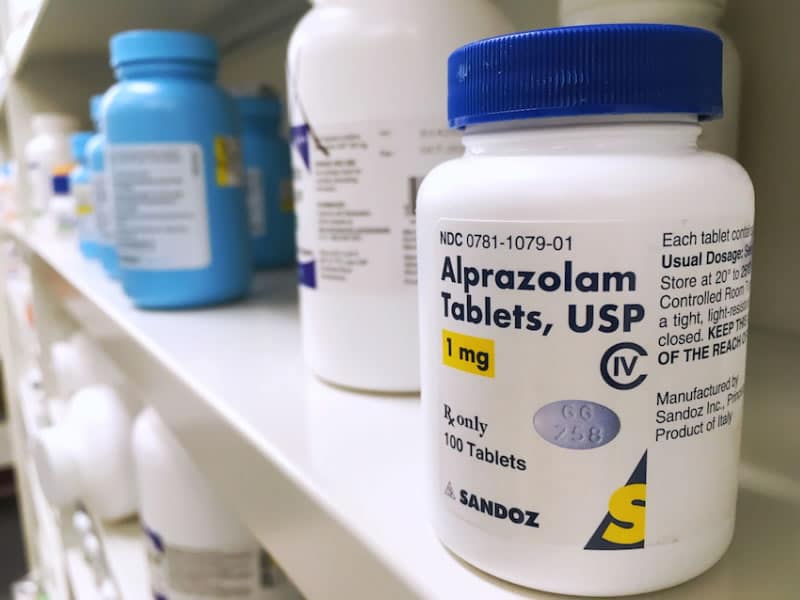Xanax® is a central nervous system depressant prescribed for anxiety disorder and panic disorder. Central nervous system depressants slow brain activity, producing a calming effect. The generic name for Xanax is alprazolam. In the United States, it is the most commonly prescribed psychotropic medication, meaning medication that affects how the brain functions.
Xanax is in the category of drugs called benzodiazepines, which have street names such as “candy,” “downers,” “sleeping pills,” and “tranks,” as in tranquilizers. Xanax comes in pill, tablet or liquid format and can be ingested or snorted.
Prescription misuse of Xanax
Many addiction specialists consider Xanax to be highly addictive and it causes greater withdrawal symptoms compared to other benzodiazepines. Xanax is most often implicated in drug-related emergency room visits and, in general, benzodiazepines are involved in roughly one-third of intentional overdoses.
What does Xanax do to your body and brain?
Xanax acts on the gamma-aminobutyric acid (GABA) receptors, which are neurotransmitters or chemical receptors in the brain. This causes a calming effect on the body and the brain that helps relieve anxiety and panic attacks, even insomnia.
If Xanax is misused; that is, if taken in greater quantities than prescribed or used in combination with other drugs—including alcohol—it can cause euphoria and even more intense feelings. These pleasurable, euphoric feelings can lead to prescription drug abuse and increase the risk for addiction to Xanax.
Generally, use of Xanax should be avoided in people at increased risk of suicide or for those who are using alcohol.
Coincidentally, however, there are some benzodiazepines that are commonly prescribed for alcohol withdrawal because they act similarly to alcohol upon the brain. Notably, they help reduce withdrawal symptoms like agitation and alcohol withdrawal seizures and can help prevent delirium tremens (DTs).
Chlordiazepoxide, diazepam, lorazepam, and oxazepam are the most common benzodiazepines prescribed for alcohol withdrawal.
Why people mix Xanax and alcohol
Alcohol, like Xanax, is a central nervous system depressant. A person may assume the calming effects of alcohol combined with the already calming effects of Xanax will produce an even better, more euphoric and relaxed feeling.
People may mix Xanax and alcohol intentionally, in order to get high or to get a different kind of high, or they may be unaware of the dangerous side effects of mixing Xanax and alcohol.
While there may be an initial feeling of euphoria, the side effects of mixing Xanax and alcohol can be extremely dangerous, even lethal. Some of the side effects are short-term while others are more long-term and may lead to chronic health conditions.
What are the side effects of mixing Xanax and alcohol?
Those little warnings on pill bottles about not drinking alcoholic beverages with medications are there for good reason.
First, you have no idea how your own body will respond to the mixture of medication and alcohol.
Everybody metabolizes substances differently. Your own health as well as body weight influence your ability to process what you put into your system.
Second, any medication you’re taking already has its own set of potential side effects and purported benefits.
Combined with alcohol, the side effects will be amplified. So, the side effects of mixing Xanax with alcohol are likely to be extreme sedation and respiratory depression (your breathing slows down considerably). This can be life-threatening and may even lead to coma.
People who take both Xanax and alcohol may also experience side effects such as:
- Difficulty walking
- Dizziness
- Drowsiness
- Fainting
- Irritability
- Lack of coordination
- Nausea
- Slowed pulse
- Slurred speech
If you’re taking Xanax and you decide to mix it with alcohol, it may seem like a harmless way to get high, but you could end up with chronic and lifelong health issues, including worsened mental health problems.
Long-term side effects of mixing Xanax and alcohol include things like:
- Brain damage
- Heart attack, stroke
- Liver damage, liver failure, liver cancer
Are you struggling with Xanax and/or alcohol addiction?
While some alcohol and drug rehab centers focus on treating the condition itself, at Lifetime Recovery in Mullica Hill, New Jersey, we strive to get to the root cause of addiction and mental health issues. Our vision is to provide people with total freedom from addiction by providing winning solutions that advance the entire person in the recovery process.



